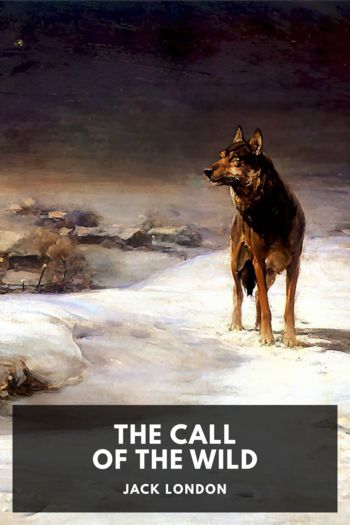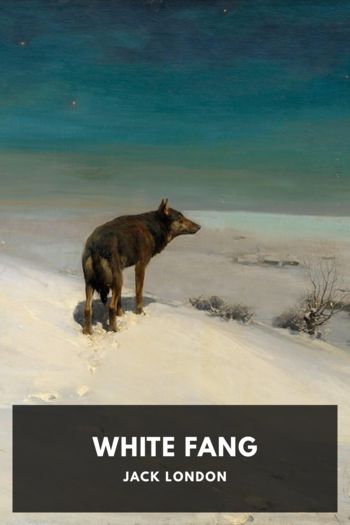The Call of the Wild by Jack London (world best books to read TXT) 📕

Description
Jack London spent nearly a year in Alaska and the Klondike, mining for gold and braving the Alaskan winter. There he was inspired to write what would become The Call of the Wild, one of his most famous novels. The Call of the Wild tells the tale of a domesticated dog stolen from his California family and sold to sledders in Alaska. As he adapts to the harsh and wild environment, he slowly sheds domestication and returns to his primal roots.
The Call of the Wild was London’s first major success, ensuring he’d have a readership for his future writing and paving the way for him to become one of the first writers to amass a fortune from just his fiction.
Read free book «The Call of the Wild by Jack London (world best books to read TXT) 📕» - read online or download for free at americanlibrarybooks.com
- Author: Jack London
Read book online «The Call of the Wild by Jack London (world best books to read TXT) 📕». Author - Jack London
Sometimes as he crouched there, blinking dreamily at the flames, it seemed that the flames were of another fire, and that as he crouched by this other fire he saw another and different man from the halfbreed cook before him. This other man was shorter of leg and longer of arm, with muscles that were stringy and knotty rather than rounded and swelling. The hair of this man was long and matted, and his head slanted back under it from the eyes. He uttered strange sounds, and seemed very much afraid of the darkness, into which he peered continually, clutching in his hand, which hung midway between knee and foot, a stick with a heavy stone made fast to the end. He was all but naked, a ragged and fire-scorched skin hanging part way down his back, but on his body there was much hair. In some places, across the chest and shoulders and down the outside of the arms and thighs, it was matted into almost a thick fur. He did not stand erect, but with trunk inclined forward from the hips, on legs that bent at the knees. About his body there was a peculiar springiness, or resiliency, almost catlike, and a quick alertness as of one who lived in perpetual fear of things seen and unseen.
At other times this hairy man squatted by the fire with head between his legs and slept. On such occasions his elbows were on his knees, his hands clasped above his head as though to shed rain by the hairy arms. And beyond that fire, in the circling darkness, Buck could see many gleaming coals, two by two, always two by two, which he knew to be the eyes of great beasts of prey. And he could hear the crashing of their bodies through the undergrowth, and the noises they made in the night. And dreaming there by the Yukon bank, with lazy eyes blinking at the fire, these sounds and sights of another world would make the hair to rise along his back and stand on end across his shoulders and up his neck, till he whimpered low and suppressedly, or growled softly, and the halfbreed cook shouted at him, “Hey, you Buck, wake up!” Whereupon the other world would vanish and the real world come into his eyes, and he would get up and yawn and stretch as though he had been asleep.
It was a hard trip, with the mail behind them, and the heavy work wore them down. They were short of weight and in poor condition when they made Dawson, and should have had a ten days’ or a week’s rest at least. But in two days’ time they dropped down the Yukon bank from the Barracks, loaded with letters for the outside. The dogs were tired, the drivers grumbling, and to make matters worse, it snowed every day. This meant a soft trail, greater friction on the runners, and heavier pulling for the dogs; yet the drivers were fair through it all, and did their best for the animals.
Each night the dogs were attended to first. They ate before the drivers ate, and no man sought his sleeping-robe till he had seen to the feet of the dogs he drove. Still, their strength went down. Since the beginning of the winter they had travelled eighteen hundred miles, dragging sleds the whole weary distance; and eighteen hundred miles will tell upon life of the toughest. Buck stood it, keeping his mates up to their work and maintaining discipline, though he, too, was very tired. Billee cried and whimpered regularly in his sleep each night. Joe was sourer than ever, and Sol-leks was unapproachable, blind side or other side.
But it was Dave who suffered most of all. Something had gone wrong with him. He became more morose and irritable, and when camp was pitched at once made his nest, where his driver fed him. Once out of the harness and down, he did not get on his feet again till harness-up time in the morning. Sometimes, in the traces, when jerked by a sudden stoppage of the sled, or by straining to start it, he would cry out with pain. The driver examined him, but could find nothing. All the drivers became interested in his case. They talked it over at mealtime, and over their last pipes before going to bed, and one night they held a consultation. He was brought from his nest to the fire and was pressed and prodded till he cried out many times. Something was wrong inside, but they could locate no broken bones, could not make it out.
By the time Cassiar Bar was reached, he was so weak that he was falling repeatedly in the traces. The Scotch halfbreed called a halt and took him out of the team, making the next dog, Sol-leks, fast to the sled. His intention was to rest Dave, letting him run free behind the sled. Sick as he was, Dave resented being taken out, grunting and growling while the traces were unfastened, and whimpering brokenheartedly when he saw Sol-leks in the position he had held and served so long. For the pride of trace and trail was his, and, sick unto death, he could not bear that another dog should do his work.
When the sled started, he floundered in the soft snow alongside the beaten trail, attacking Sol-leks with his teeth, rushing against him and trying to thrust him off into the soft snow on the other side, striving to leap inside his traces





Comments (0)